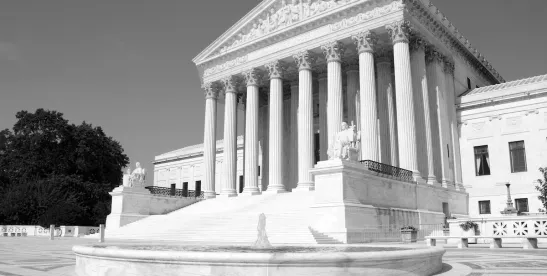The Supreme Court of the United States recently overturned the forty-year-old Chevron doctrine in two cases decided together, Loper Bright Enterprises v. Raimondo and Relentless, Inc. v. Department of Commerce, No. 22-451, 603 U.S. (2024) (hereafter Loper Bright). Both cases challenged the interpretation by the National Marine Fisheries Service of the Magnuson-Stevens Act which requires fishing boats to have a government-appointed or certified shiprider to monitor compliance with catch limits. The cost of the shiprider is borne by the fishing companies.
The Chevron doctrine, arising out of the Chevron U.S.A., Inc. v. Natural Resources Defense Council, Inc., 468 U.S. 837 (1984) case, set forth a two-step approach to determine whether a federal court should defer to a federal agency’s interpretations of a statute which it administers. Under Chevron, the court first determines whether the statute in question is ambiguous. If it is, the court then decides whether the agency’s interpretation is reasonable. If an agency’s interpretation of an ambiguous statute is reasonable, the court should defer to the agency’s action and interpretation.
While the holding of Chevron itself remains undisturbed, as do previous cases decided using the Chevron doctrine, the Court has overturned the Chevron two-step test. Instead, agency interpretations will now be one of many possible sources of meaning for the court to consider when deciding the meaning of ambiguous statutes, alongside the traditional canons of construction, stare decisis, legislative history, and purpose.
The majority of the Court, in an opinion, authored by Chief Justice Roberts, held that the Chevron test is at odds with Section 706 of the Administrative Procedure Act, which places the role of deciding questions of law expressly within the Court’s domain, with factfinding resting with the agency. Therefore, the decision purports to right the error of allowing agencies to resolve both questions of fact and questions of law.
The Dissenting Opinion, authored by Justice Kagan and joined by Justices Sotomayor and Jackson, as well as other critics of this overturning of Supreme Court precedent, admonishes the Court for this decision because agencies are often the subject-matter experts and drafters of such technical legislation, thus better equipped to interpret same.
What has Changed?
Nothing. Yet.
Loper Bright put the owners of a New England fishing company against the National Marine Fisheries Service, making this decision feel like a David and Goliath-style denouement—the little guy fought the administrative state and won.
Chief Justice Roberts noted that the decision to uphold agency action in Chevron remains good law, and that past cases are not subject to being overruled simply because they relied on Chevron. The Court goes on to say that special justification could bring some of those cases before the court again. There is no further explanation for what special justification means, and it is too early to tell if any cases claiming special justification are coming. In addition, nothing has substantially changed in terms of administrative authority and the entities or people currently subject to administrative authority.
What Can We Expect?
Now that Loper Bright has taken for the courts the power to interpret statutes without deference to agency interpretations, courts can potentially use this to restrain agency authority. This power shift between regulated entities and the agencies that regulate them is possibly encouraging for regulated entities who now have a more favorable environment in which to challenge promulgated rules from agencies.
At the federal level, we could potentially see increased transparency as agencies adapt their policy processes and decision making to insulate them from judicial challenge. In the longer term, we can (only) hope that there will be a commensurate increase in clarity of federal legislative writing in anticipation that ambiguous language could invite litigation.
In the short term, overturning Chevron has created the potential for increased litigation. The majority has kept the Chevron holding intact and will not disturb any cases decided using Chevron deference without special justification. However, the lack of explanation of what qualifies as a special justification is an area of ambiguity left open for rehashing old cases. We can also anticipate an increase in legal challenges on existing agency rules that have not yet been challenged as well as future agency rulemaking.
With decreased deference to agency interpretation of statutes, judicial evaluations of agency actions may be harder to predict. This could present challenges for agencies and businesses alike as they try to implement policies and navigate regulations.
What about Pennsylvania?
At the state level, we may see state agency expansion to fill gaps that federal agencies cannot cover. In the overturning of Roe v. Wade, we saw a nationwide influx of state level legislation to either expand, secure, regulate, or reduce abortion rights. Here, states may once again introduce legislation to fill any perceived gaps in the regulatory framework. This has the potential to increase disparity in what regulations look like across state lines.
According to University of Pittsburgh Vice Dean of the School of Law, Jerry Dickinson, the Pennsylvania Supreme Court has never expressly adopted the Chevron doctrine, but has acknowledged that Pennsylvania’s own approach to agencies’ interpretation of Pennsylvania statutes is indistinguishable from Chevron. Dickinson further observes that while there appear to be political camps favoring and disfavoring Chevron deference at the federal level—liberals favoring and conservatives disfavoring—these positions appear to be reversed among Pennsylvania Supreme Court Justices.




 />i
/>i

